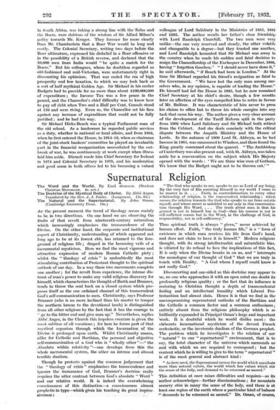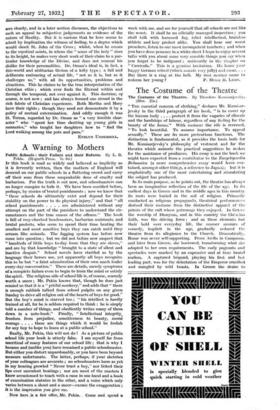Supernatur al Religion
The Doctrine of the Mystical Body of Christ. By Abbe Anger.
(Cambridge University Press. Ifs.)
AT the present moment the trend of theology seems mainly to be in two directions. On one hand we are observing the fruits of that revolt from nineteenth-century naturalism which increasingly emphasizes the transcendence of the Divine. On the other hand, the corporate and institutional aspect of Christianity, understanding of which appeared not long ago to be at its lowest ebb, has returned to the fore- ground of religious life ; draped in the becoming veils of a gacramental mysticism. Here we find the most vigorous and attractive expression of modern Roman Catholic piety; whilst the " theology of crisis " is undoubtedly the most 'stimulating contribution of Protestant thought to the spiritual outlook of our day. In a way these two movements complete one another ; for the revolt from experience, the intense dis- trust of man's power to make any valid religious discovery for himself, which characterizes the thought of Barth and Brunner, tends to throw the soul back on a closed system which pro- poses itself as the one ordained channel of this transcendent Cod's self-communication to men. Christianity, says Professor Brunner (who is no more inclined than his master to temper the northern breeze to the devotional lamb) is distinguished from all other religions by the fact that it has the courage to
go to the bitter end and give man up." NeVertheless, replies Abbe Anger, in the Church this hopeless creature is given the most sublime of all vocations ; for here he forms part of that mystical organism through which the Incarnation of the Divine is prolonged upon earth. Whilst Christianity means, alike for Catholic and Barthian, the personal and objective self-communication of a God who is " wholly other "—" the Absolute within relativity "—one develops from this the whole sacramental system, the other an intense and almost terrible dualism.
Though he protests against the common judgement that the " theology of crisis " emphasizes the transcendence and ignores the immanence of God, Brunner's doctrine really requires the utter contrast between God's absolute " Word " and our relative world. It is indeed the overwhelming consciousness of this distinction—a consciousness almost prophetic in type—which gives his teaching its great impres- siveness
" The God who speaks to me, speaks to mo as Lord of my being. By the very fact of His asserting Himself in my world I cease to be master in it. . . . Faith, in contradistinction to every other relationship of religion, is the transcendent relationship ; which means the relation towards the God who speaks to me from outside .myself, and whose secret is unfolded to me only in this communica- tion through His Word.. . . The truth about man is that his ground is not in himself but in God—that his essence is not in self-sufficient reason but in the Word, in the challenge of God, in responsibility, not in self-sufficiency."
Thus spiritual truth is always " given," never achieved by -human effort. Faith, " the truly human life," is a " form of existence in which man receives his life flora God's hand, and does not claim to have it in himself." Modern religious thought, with its strong intellectualist and naturalistic bias. is vitiated by its refusal to face the implications of this fact, It is only when the Divine breaks in on us, and " interrupts the monologue of our thought of God" that we are truly in touch with Reality. " A God whom I myself could know is not really God."
Disconcerting and one-sided as this doctrine may appear to us, no one who approaches it with an open mind can doubt its profoundly religious quality ; or the fact that its influence is restoring to Christian thought a depth of transcendental feeling and an intellectual humility which Liberal Pro- testantism had almost slain. Hence it is that we find in the uncompromising supernatural outlooks of the Barthian and the Catholic a common factor and a common enthusiasm entirely absent from the religious philosophy which is so brilliantly expounded in Principal Oman's large and important 'work. It is doubtful which he would dislike most : the elaborate incarnations' mysticism of the devout French ecclesiastic, or the inveterate dualism of the German prophet. The problem which he investigates is the relation of our " natural " to our " supernatural " environment, that is to say, the total character of the universe which surrounds us and with which we are required to correspond ; but the content which he is willing to give to the term " supernatural " is of the most general and abstract kind :
" As here used, the Supernatural means the world which manifest4 more than natural values, the world which has values which stir the sense of the holy, and demand to be esteemed as sacred."
This definition at once raises difficulties and reguires—ai its 'author acknowledieS—further discriminations far mountain 'scenery sties in many the sense of the holy, and there is at least one region of the earth where a partici:tier kind Of baboon "` demands to be esteemed as sacred." I)r. Cian, of course,
sees clearly, and in a later section discusses, the objections to such an appeal to subjective judgements as evidence of the nature of Reality. But it is curious that he here seems to admit by implication the witness of feeling, to a degree which would shock St. John of the Cross ; whilst, when he comes to the mystical saints, in whom the " sense of the holy " rises to its height, he makes very short work of their claim to a par- ticular knowledge of the Divine, and does not conceal his dislike for their personalities. Dr. Oman's ideal is, in fact, a this-world and utilitarian theism of a lofty type ; a full and deliberate embracing of actual life, " not as it is, but as it challenges us," with all its opportunities, problems and situations. This he claims to be the true interpretation of the Christian ethic ; which ever finds the Eternal within and through the temporal, not over against it. This doctrine, of course, is not new ; and has always formed one strand in the rich fabric of Christian experience. Both Martha and Mary have their rights ; though they need not demonstrate it by a policy of mutual extermination. And oddly enough it was St. Teresa, regarded by Dr. Oman as "a very forcible char- acter " who " spent her time shutting up young girls in nunneries," who taught her daughters how to " find the Lord walking among the pots and pans."
EvxLYN UNDERHILL.



































 Previous page
Previous page